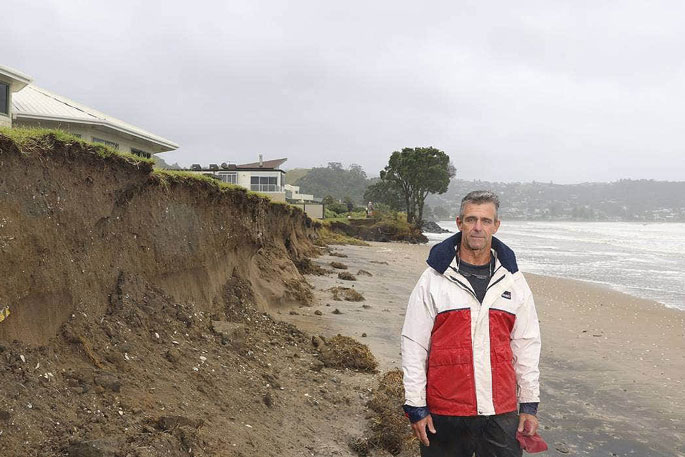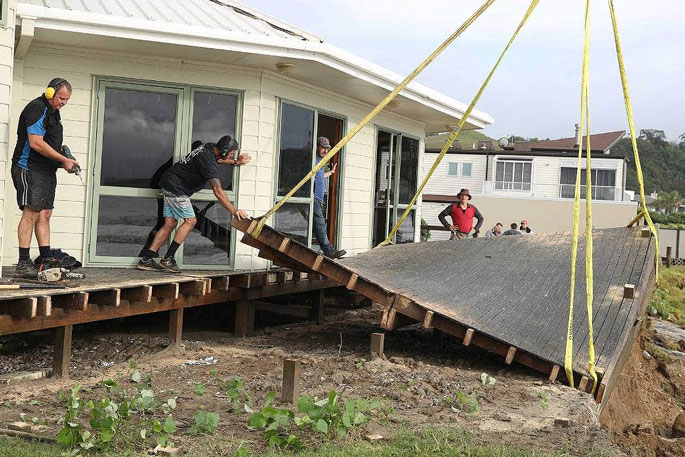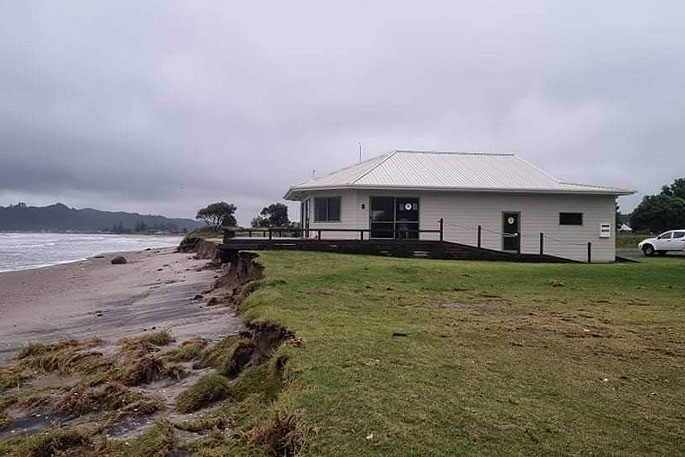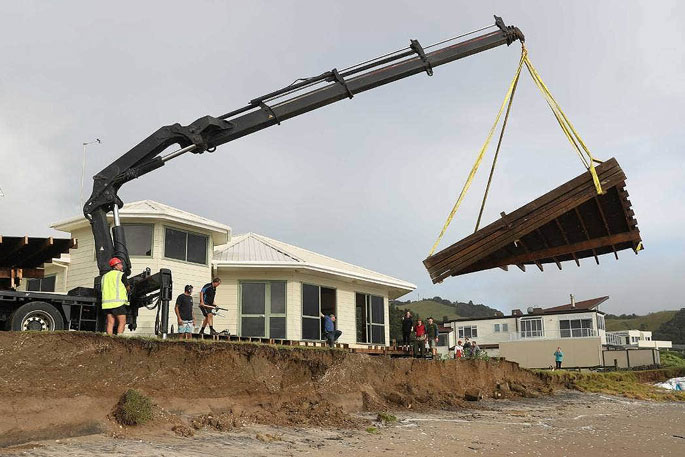Volunteers are working this morning to remove pieces of a Whitianga boat club's deck following erosion by ferocious seas whipped up by Ex Cyclone Hale.
Armed with headlamps and reciprocating saws, the members of the Whitianga-based Mercury Bay Boating Club were at the ready on Tuesday night to save their clubhouse by sacrificing the building's deck.
Club Commodore Jonathan Kline says the situation was grave, and after high tide at 10.40pm on Tuesday night accelerated efforts were being made to relocate the club's premise further in inland.
Dawn broke on Wednesday showing the deck significantly undermined and it was craned off the site about 8am.
Kline says that Hale created 'devastating waves that undermined the earth underneath our beach deck”.
'We lost approximately another two and a half metres. We finished the high tide cycle with part of the decking hanging in the air and all efforts this morning have focussed on removing the deck and protecting the building.”
A high tide earlier on Tuesday had scoured away large chucks of earth from the foreshore in front of the historic club.
The club, to which Sir Michael Fay belonged, was instrumental in the push to challenge for the 1987 America's cup.
That challenge was a 'David and Goliath” battle, says Kline, much like the efforts to save the club's building.
Over 24 hours to Tuesday afternoon, some two meters of land had been washed away, Kline says.
Kline says that in the past the club had 'been monitoring diligently the recession of the land in front of us,” but like his volunteer committee who joined him to witness the process unfold that evening, hadn't anticipated it would occur so quickly.
 Commodore Jonathan Kline on the beach before last night's high tide that undermined the club's deck.
Commodore Jonathan Kline on the beach before last night's high tide that undermined the club's deck.
'We thought we had a couple of years to do it. But here now, in the space of two weeks, we don't have those couple of years any more.”
Over the last three to six months, Kline says the club has witnessed 'an acceleration in the loss of the bank. As a committee we explored all options with council ... It was determined that council would not support financially any sort of hard structure, like the breakwater”.
Kline and his committee have been liaising with both the Waikato Regional and Thames Coromandel District councils to ascertain whether the club's plight could trigger an emergency response that would see a temporary defence of concrete blocks placed on the foreshore to prevent the worst of Tuesday's abnormally high tide.
 The lift gets under way on Wednesday.
The lift gets under way on Wednesday.
Delivered by truck from Paeroa on Tuesday morning at a cost of between $6000-8000, the blocks were intended to prevent a capitulation to the sea.
Instead, the blocks sat idle as the sea tore soil and sand from beneath the clubrooms. The reason, says Kline, is the legal grey area in which the club's circumstance exists.
'We are in a funny area. We are a private dwelling, on council land. We do not own the land, we lease the land. So, we cannot choose to do whatever we want to do out in front.
'We did not want to be the renegade club that put down a defence system without the support and without the endorsement of the authorities ... We were informed we don't fit into the law that allows those blocks to be placed in front of this club. For them to give that okay to us.”
Kline and his committee were left between the devil and the deep blue sea. Either arrange the defences without council consent and risk repercussions, or let the waves do their work.
 Sections of the unprotected shoreline were more severely eroded. Photo: Richard Shelford-Woodcock.
Sections of the unprotected shoreline were more severely eroded. Photo: Richard Shelford-Woodcock.
'It is extremely disappointing to do, we have a potential solution sitting right there, but we cannot make the decision to put them on the beach for fear of the repercussions,” says Kline.
After Tuesday night's devastation, plans have expedited to find a contractor who can relocate the remainder of the building to a location further away from the crumbling seashore.
Estimated to be in the range of '$140,000-$200,000” to move what remains of the building to a site further from the foreshore, the club has said they will require as much support from the community as they can get.
After a notable absence on Tuesday night, Thames Coromandel District Council staff were on hand on Wednesday to support temporary coastal defence measures.
The club's vice commodore Simon Rawlinson says he's glad the council are in attendance. 'I'd rather have them on side than offside.”
The plan now, according to commodore Kline, is to fill geotextile bags with sand to prevent any further erosion, and in turn provide sufficient land to stage a jack-up of the building to transport it to higher ground.
Next door to the club, Bruce Robert-Troughear had also lost a portion of the garden of his 'dream house”. He made the call to fill bags with quarry spoil and erect a temporary sea wall to prevent further erosion in the overnight high tide.
Thames-Coromandel District Council Mayor Len Salt says clean up efforts are underway this morning around the eastern seaboard of the Coromandel following last night's storm surge.
'Our district has fortunately not been as badly damaged as it could have been – and while it's been a rough night, I'm pleased to say things have eased off now.
'Now the rain has cleared, we are going to get the clean-up done fairly quickly.
'While we're dealing with incidents right across the district, there's been no major damage aside from erosion outside the Mercury Bay Boating Club in Whitianga which has undercut the deck.
'We acknowledge this is a valuable community asset and support the efforts of the local volunteers who are currently removing the deck in pieces.”
Council has been having ongoing dialogue over a number of years about hazard management and relocation of the facility as the only practicable long-term solution.
On Monday, ahead of the weather event, council had a request from the Mercury Bay Boating Club to place 60 x 600 kg concrete blocks, they had obtained, on the beach as a protective barrier.
A discussion was had regarding Council taking responsibility by using Section 330 of the Resource Management Act, however the provisions under this section are designed for public works and utilities.
It was suggested in the short term that the Club could look to remove the deck, which would buy some time so they could continue progressing their longer-term solution of moving the building.
This is the situation the Club is now dealing with this morning, which our Council is assisting with. This includes helping with the removal of the deck, storage of property and supporting a plan and fundraising efforts to assist with moving the building.
Under the lease conditions, which the Boating Club are aware of, the building was constructed in a way that it could be moved, if the site became impacted by coastal erosion.



1 comment
I wonder
Posted on 11-01-2023 11:45 | By Kancho
If the building is constructed in such a way that it can be uplifted and moved . Guess that's up to the club and council etc
Leave a Comment
You must be logged in to make a comment.